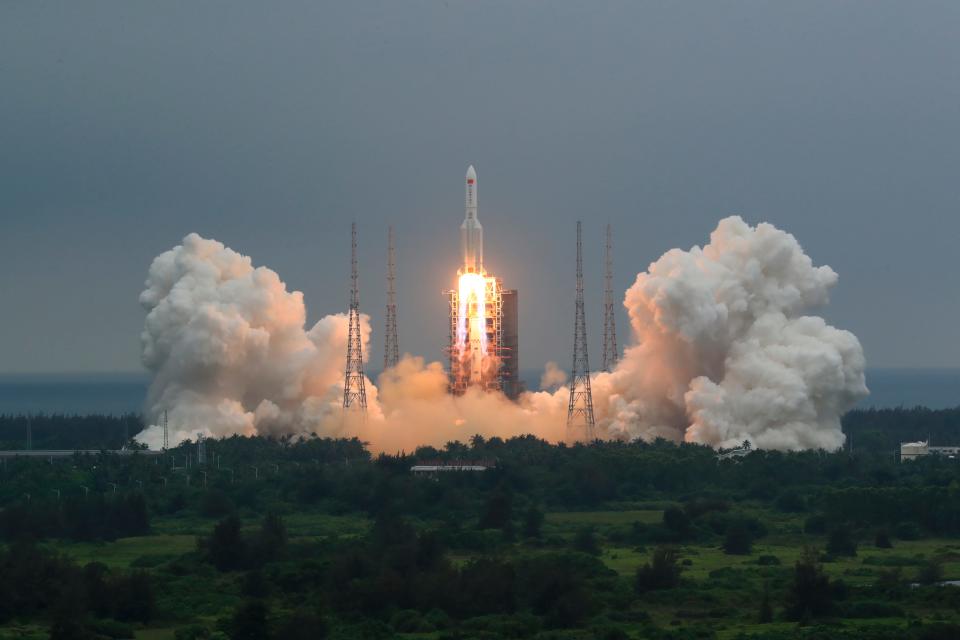Heads-up: A Chinese rocket that might be out of control is hurtling back to Earth. What you should know.
A section of a large Chinese rocket is falling back to Earth and is expected to crash sometime Saturday. It could strike an inhabited area, experts warn.
Where it will hit “cannot be pinpointed until within hours of its reentry,” the Pentagon said in a statement this week.
Related: NASA astronauts return to Earth
U.S. officials are watching the rocket's trajectory. Secretary of Defense Lloyd Austin is "aware and he knows the space command is tracking, literally tracking this rocket debris," Pentagon spokesman John Kirby said.
Here's what you should know:

Did China launch a rocket?
Yes. The Long March 5B rocket carrying China's Tianhe space station core module lifted off from the Wenchang Space Launch Center in southern China's Hainan province April 29. Known as the Heavenly Harmony, the space station will be China's first to host astronauts long-term.
China plans 10 more launches to carry additional parts of the space station into orbit.
Is the Chinese rocket falling to Earth?
Yes, and “it’s potentially not good,” Jonathan McDowell, an astrophysicist at the Astrophysics Center at Harvard University, told the Guardian.
Usually discarded core rockets, or first-stage rockets, plunge to the sea soon after liftoff and don’t go into orbit like this one did.
China’s space agency has yet to say whether the core stage of the huge rocket is being controlled.
Where will the Chinese rocket land?
No one knows for sure. McDowell told CNN that pinpointing where debris could be headed is almost impossible because of the speed the rocket is traveling – even slight changes in circumstance drastically change the trajectory.
The debris will be dragged toward Earth by increasing collisions with molecules in the Earth’s atmosphere, Space News said.
One group has made a prediction, however: The nonprofit Aerospace Corp. expects the debris to hit the Pacific Ocean near the equator after passing over eastern U.S. cities. Its orbit covers a swath of the planet from New Zealand to Newfoundland.
How big is the Chinese rocket that's falling to Earth?
It's roughly 100 feet long and and would be among the biggest pieces of space debris to fall to Earth.
"It's almost the body of the rocket, as I understand it, almost intact, coming down," Kirby said.
The newspaper Global Times, published by the Chinese Communist Party, said that the stage’s “thin-skinned” aluminum alloy exterior will easily burn up in the atmosphere and that the risk to people on the surface is extremely remote.
Has a rocket fallen to Earth before?
Yes. Last year, part of a Chinese rocket, one of the largest pieces of uncontrolled space debris ever, passed directly over Los Angeles and Central Park in New York City before landing in the Atlantic Ocean, CNN said.
The 18-ton rocket that fell last May was the heaviest debris to fall uncontrolled since the Soviet space station Salyut 7 in 1991.
China’s first space station, Tiangong-1, crashed into the Pacific Ocean in 2016 after Beijing confirmed it had lost control. In 2019, the space agency controlled the demolition of its second station, Tiangong-2, in the atmosphere.
Contributing: The Associated Press
This article originally appeared on USA TODAY: Chinese rocket reentry: Rocket falling to Earth may be out of control

